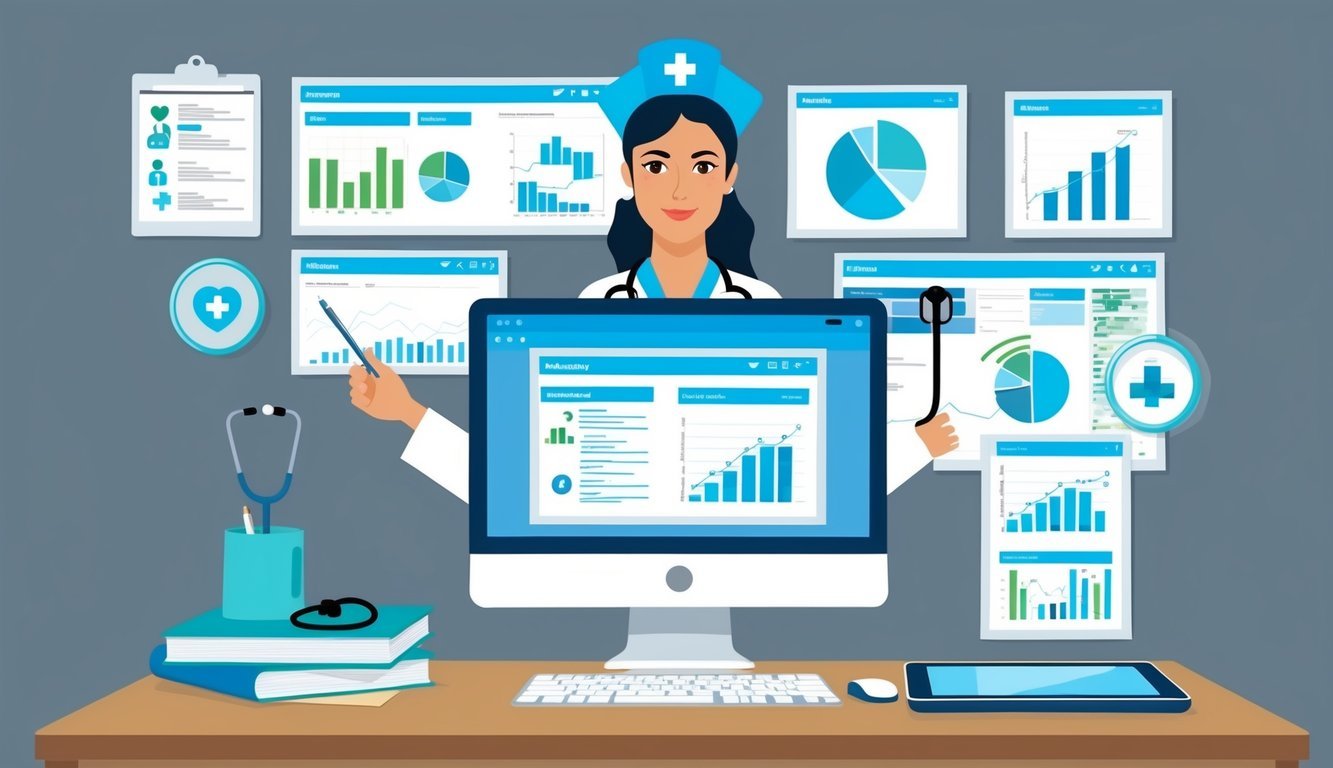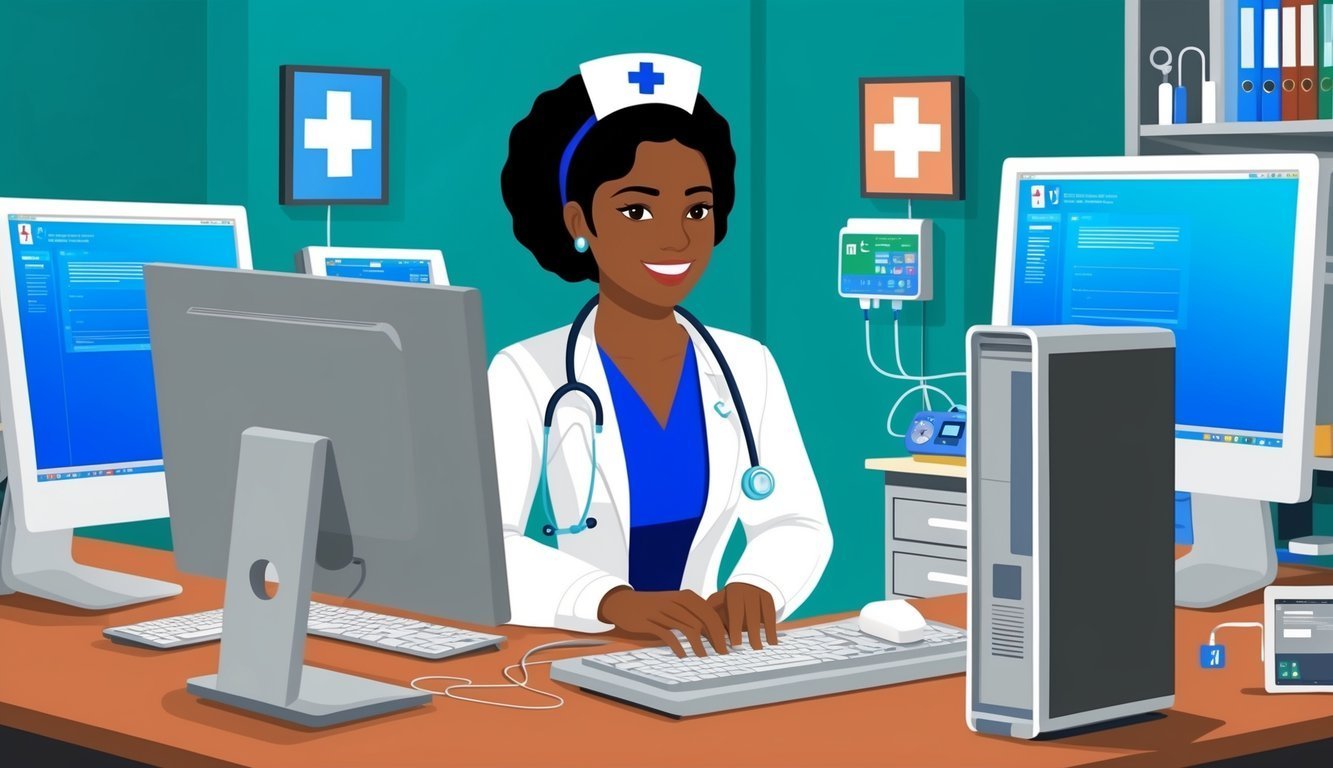The role of a nurse informaticist is becoming increasingly important in today’s healthcare system.
Nurse informaticists leverage technology to improve patient care and streamline nursing processes.
This unique intersection of nursing and information technology enables them to play a critical role in enhancing patient outcomes and making healthcare delivery more efficient.
Nurse informaticists help bridge the gap between clinical practice and technology by managing data, ensuring privacy, and supporting healthcare professionals in adapting to new systems.
With the rapid advancements in medical technology, understanding the necessary skills and education paths is essential for anyone interested in this field.
Whether you are already in nursing or contemplating a career change, learning about nursing informatics can unlock new opportunities.
This field not only offers a chance to improve patient care but also allows for significant professional growth.
Key Takeaways
- Nurse informaticists utilize technology to enhance healthcare delivery.
- There are specific educational pathways and certifications to enter this field.
- Continuous professional development is key to staying current in nursing informatics.
Role and Scope of Nursing Informatics

Nursing informatics is a vital area that bridges nursing practice and information technology.
It focuses on managing data and information to improve patient outcomes and safety.
Understanding its definitions, core functions, and impacts can enhance your practice as a nurse informaticist.
Definition of Nursing Informatics
Nursing informatics is the specialty integrating nursing science with information management and analytical sciences.
It aims to manage and communicate data effectively in nursing practice.
A nurse informaticist typically has a nursing background and applies technology to improve healthcare delivery.
This field supports nurses in accessing and using electronic health records (EHRs) and other data systems.
With proper tools, they can analyze patient information to make better decisions.
The role combines clinical experience with data handling to enhance patient care.
Core Functions of a Nurse Informaticist
The core functions of a nurse informaticist include:
- Data Management: Collecting, storing, and retrieving patient data.
- EHR Optimization: Ensuring that electronic health records meet clinical needs.
- Education and Training: Providing training for staff on new technologies and systems.
- Policy Development: Involvement in creating policies that govern health informatics use.
These functions are essential in supporting evidence-based practice.
Nurse informaticists play a critical role in helping healthcare teams improve workflows and streamline communication.
By focusing on these core areas, they can greatly enhance nursing practice.
Impact on Patient Care and Safety
Nursing informatics has a significant impact on patient care and safety.
By improving data accuracy, it helps prevent medical errors.
Proper data management leads to better patient outcomes through timely interventions.
Nurse informaticists can use health informatics tools to track patient conditions more effectively.
The integration of evidence-based practice into daily nursing activities ensures that care is based on the best available data.
This method supports:
- Enhanced communication among healthcare providers.
- Improved patient engagement through accessible information.
- Increased efficiency in care delivery processes.
By understanding and applying nursing informatics, you contribute to a safer healthcare environment that improves patient care and outcomes.
For more information, consider exploring nursing informatics resources.
Educational Pathways and Certification
Pursuing a career as a nurse informaticist requires a solid foundation in nursing education, certification in informatics, and potentially an advanced degree.
Each step is essential for gaining the knowledge and credentials needed to succeed in this field.
Nursing Educational Background
To start your journey, you must obtain a nursing degree.
The most common pathways include:
- Associate Degree in Nursing (ADN): A two-year program that qualifies you to take the NCLEX-RN exam.
- Bachelor of Science in Nursing (BSN): A four-year degree providing a broader education and enhanced career opportunities.
Most positions in nursing informatics prefer candidates with a BSN due to the advanced clinical skills and knowledge gained through a comprehensive curriculum.
You will learn about patient care, health assessments, and healthcare systems, which will be crucial in an informatics role.
Informatics Nursing Certification
To specialize as a nurse informaticist, obtaining the Informatics Nursing Certification from the American Nurses Credentialing Center (ANCC) is vital.
This certification demonstrates your competency in nursing informatics.
Requirements for certification include:
- An active RN license.
- At least two years of nursing experience.
- Completion of 30 hours of continuing education in nursing informatics.
Passing the ANCC exam evaluates your understanding of how information technology impacts nursing practice.
This certification can enhance your career prospects and earning potential.
Advanced Informatics Education
Consider pursuing a Master of Science in Nursing (MSN) with a focus on nursing informatics.
An advanced degree can deepen your expertise and open doors to leadership roles.
Programs typically cover topics like:
- Clinical data management
- Health information systems
- Strategic planning for informatics
Completing an MSN prepares you for higher-level positions and may lead to roles such as Chief Nursing Informatics Officer or informatics program director.
This advanced education, combined with relevant certification, positions you well in this evolving field.
Technological Competency and Skills

In the nursing informatics field, having specific technological competencies and skills is essential.
You will need a strong understanding of health information systems, data analysis techniques, and project management to succeed.
Health Information Systems
As a nurse informaticist, familiarity with Electronic Medical Records (EMR) and Electronic Health Records (EHR) is crucial.
These systems are designed to improve patient care by providing quick access to health information.
Key elements you should know include:
- Interoperability: Understanding how different systems communicate.
- Data Security: Familiarity with regulations like HIPAA to protect patient data.
- Usability: Evaluating EHR design to ensure it meets user needs.
You will often engage with health data systems to streamline healthcare delivery.
Understanding the technical aspects can enhance workflows and patient care.
Data Analysis and Management
Data management is key in assessing patient outcomes and improving care quality.
Nurse informaticists must be skilled in analyzing large sets of health data to extract meaningful insights.
Consider these technical skills:
- Statistical Software: Knowledge of tools like SPSS or R for data analysis.
- Data Visualization: Ability to present data using graphs and charts for better understanding.
- Database Management: Proficiency in managing databases to ensure data integrity.
These skills support evidence-based practices and help in decision-making.
Analyzing health data effectively can lead to improved patient safety initiatives.
Systems Implementation and Project Management
Managing projects efficiently is vital when implementing new health information systems.
As a nurse informaticist, you will oversee the integration of technology into clinical settings.
Essential project management skills include:
- Planning: Creating timelines and milestones for implementation.
- Collaboration: Working with interdisciplinary teams to ensure all needs are met.
- Evaluation: Assessing system performance post-implementation to identify improvements.
A structured approach can make system deployment smoother and more effective.
Getting familiar with programming and system architecture will also enhance your capabilities in this area.
Professional Development and Career Pathways
In nursing informatics, you have various routes for professional growth.
Career advancement opportunities, the role of professional organizations, and pathways to becoming a Chief Nursing Informatics Officer are essential areas to explore as you enhance your expertise in this field.
Career Advancement Opportunities
As a Nursing Informatics Specialist, you have several avenues for career advancement.
Many positions in this field require advanced degrees.
This may include earning a Master’s or Doctorate in Nursing Informatics.
Common roles include:
| Position | Average Salary |
|---|---|
| Nursing Informatics Specialist | $79,000 |
| Clinical Informatics Specialist | $79,000 |
| Chief Nursing Informatics Officer | $151,000 and higher |
Earning certifications, such as those offered by the American Nursing Informatics Association, can also enhance your qualifications.
With experience, you can move into leadership roles, such as Medical and Health Services Managers, where you oversee health technology implementations.
Role of Professional Organizations
Joining professional organizations like the Alliance for Nursing Informatics can significantly benefit your career.
These organizations offer networking opportunities, educational resources, and access to industry news.
They also provide continuing education, which is vital for staying current with advancements in healthcare technology.
Being active in such groups can help build your reputation and connect you with mentors.
You can attend conferences that focus on the latest trends and tools in nursing informatics, enhancing your skills and knowledge.
Becoming a Chief Nursing Informatics Officer
To become a Chief Nursing Informatics Officer (CNIO), you typically need extensive experience and education.
A Doctorate in Nursing Practice (DNP) is often preferred, focusing on clinical leadership.
Key responsibilities include:
- Leading informatics initiatives
- Developing strategic healthcare technology plans
- Ensuring compliance with regulations
To achieve this role, you should gain experience in various informatics roles, like being a Nursing Informatics Specialist.
This preparation will help you understand the complexities of both nursing and technology, ultimately positioning you for leadership in healthcare organizations.
Ethics, Privacy, and Regulatory Compliance
In the role of a nurse informaticist, you must navigate the complexities of ethics, privacy, and regulatory compliance.
These areas are essential for protecting patient information, adhering to healthcare policies, and maintaining ethical standards in clinical practice.
Safeguarding Patient Information
Safeguarding patient information is a critical responsibility.
You must ensure that electronic health records (EHR) are secure, limiting access to authorized personnel only.
Use encryption for electronic data and secure passwords to protect sensitive information.
Regular training on privacy policies improves awareness among staff.
Implementing strong data security measures helps mitigate risks.
Additionally, consider utilizing secure communication channels for sharing patient information.
You can refer to guidelines from the Health Insurance Portability and Accountability Act (HIPAA) for best practices.
Compliance with Healthcare Policies
Compliance with healthcare policies is vital for maintaining standards.
As a nurse informaticist, you should be familiar with local, state, and federal regulations that govern healthcare.
This knowledge helps ensure your organization meets quality improvement initiatives and patient safety standards.
Developing protocols that align with these regulations is essential.
Regular audits can also identify gaps in compliance.
Always update documentation related to policies to reflect changes in laws.
Being proactive in these areas helps your organization avoid legal issues and maintain its reputation.
Healthcare Ethics in Informatics
Healthcare ethics play a significant role in informatics.
As you work with patient data, consider the implications of your actions on patient trust and care.
Principles like autonomy, beneficence, and non-maleficence guide your decision-making.
Ensure that technology enhances patient welfare rather than compromising it.
Discussing ethical concerns with colleagues fosters a transparent environment.
You can also refer to the American Nurses Association (ANA) Code of Ethics for guidance on ethical practices in healthcare informatics.
Respecting these principles reinforces your commitment to quality patient care.
Frequently Asked Questions
This section addresses common questions related to the role of a nurse informaticist.
It provides clear insights for those interested in this growing field.
What qualifications are required to become a nurse informaticist?
To become a nurse informaticist, you typically need a Bachelor of Science in Nursing (BSN) at minimum.
Many pursue a Master’s degree in Nursing Informatics or related fields to advance their qualifications.
Certification in nursing informatics, such as from the American Nurses Credentialing Center, can also enhance job prospects.
What are the primary responsibilities of a nurse informaticist?
A nurse informaticist integrates nursing with information technology.
Key responsibilities include managing health information systems, analyzing data to improve patient outcomes, and providing training for staff on new technologies.
You might also work on developing policies related to patient data management.
How does one transition from clinical nursing to a career in nursing informatics?
To transition from clinical nursing to nursing informatics, start by gaining experience with health information technology in your current role.
Pursuing additional education or certification in informatics can also help you make this shift.
Networking with professionals in the field may provide valuable guidance and opportunities.
What is the average salary for a nurse informaticist in the United States?
The average salary for a nurse informaticist in the U.S. ranges from $80,000 to over $120,000 per year, depending on experience and location.
Some reports indicate that nearly half of nursing informaticists earn more than $100,000 annually.
Advanced degrees can lead to higher earning potential.
What educational programs are available for nurses seeking specialization in informatics?
Several universities offer specialized programs in nursing informatics.
You can pursue a Master’s degree or a Doctor of Nursing Practice (DNP) with a focus on informatics.
Certificate programs are also available for those who wish to specialize without committing to a full degree.
How does the integration of nurse informaticists impact patient care in healthcare organizations?
Nurse informaticists improve patient care by ensuring that healthcare providers use data effectively.
They help streamline processes, enhance communication, and optimize the use of health information systems.
This can lead to improved patient outcomes and greater satisfaction in healthcare delivery.

